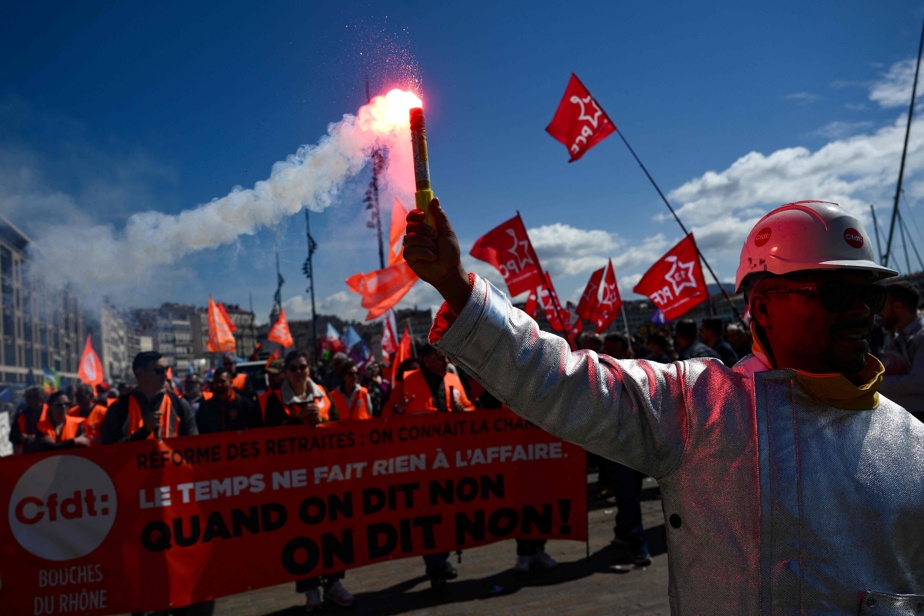(Paris) Some violence punctuated the 11th day of action against Emmanuel Macron’s pension reform as the number of demonstrators fell on Thursday in France, in an increasingly tense climate between the trade unions and the executive, which is betting on the movement running out of steam.
A restaurant in the south of Paris, which has become a symbol of the French president, who celebrated his qualification for the second round of the presidential election there in 2017, was attacked. “La Rotonde”, already the victim of an attempted fire during the marches of the “yellow vests” in 2020, this time saw its awning briefly catch fire, before the firefighters intervened.
In the capital, the CGT union reported in the middle of the afternoon of 400,000 demonstrators, against 450,000 according to him last Thursday. The authorities, who had then identified 93,000 people, have not yet released their estimate of the day.
In major French cities, turnout also seemed to be waning. In Rennes, the usual stronghold of protest, the prefecture only counted 8,500 demonstrators and the unions 20,000.
Same tendency to run out of steam in other western metropolises, such as Nantes (15,000 to 50,000 people) and Brest (10,000 to 18,000), but also in the South, in Nice (2,400 to 20,000) and Marseille (10,000 to 170,000), or even in the center in Clermont-Ferrand (7,500 to 20,000).
The authorities were planning Wednesday evening for a less massive mobilization at the national level, with between 600,000 and 800,000 people, including 60,000 to 90,000 in Paris. A total of 11,500 police and gendarmes were mobilized, while the last processions were marred by tensions.
But unions were hoping for a rebound against raising the retirement age from 62 to 64. “There is a big protest” against this reform which “still does not pass”, underlined the boss of the reformist union CFDT, Laurent Berger.
Blockages of high schools and university sites occurred Thursday morning in Lyon (east), Rennes (west), Lille (north) or Paris, including that of the prestigious Sorbonne University.
Blockades at the gates of major cities have also caused traffic jams.
Despite the breathlessness of the strikes after almost three months of arm wrestling, demonstrators still show unfailing determination, like Davy Chrétien, in Marseille (south): “We still haven’t given up and we’re not going to do it,” warns the 50-year-old territorial official.
For its part, the government is hunkering down pending the decision of the Constitutional Council, which will rule on April 14 on the constitutionality of this very unpopular reform. This high jurisdiction can censure the law, validate it totally or partially.
The flagship project of Emmanuel Macron’s second term is on track after being adopted by forceps on March 20 after weeks of demonstrations and sterile negotiations in the National Assembly.
The use of a constitutional mechanism allowing adoption without a vote in Parliament did not disarm the opposition and the unions. On the contrary, relations between the head of state and the social partners, in particular the reformist central CFDT, are turning sour.
A meeting on Wednesday between Prime Minister Elisabeth Borne and the inter-union – counting 8 organizations – came to an end, the unions speaking of “failure”, the CGT even denouncing a “obtuse, radicalized and disconnected government”.
From China, Emmanuel Macron for his part replied via his entourage by insisting on a project “democratically supported” and by rejecting the responsibility for the failure of the dialogue on the unions, in particular the CFDT, which “did not want to enter in a compromise”.
“I say ‘stop the provocation’. It doesn’t make sense, we’re not in a ring. I’m not the problem, ”retorted Laurent Berger on RTL radio on Thursday. “We disagree, not at war,” assured Labor Minister Olivier Dussopt.
An inter-union is scheduled for the evening to decide on a new day of mobilization before the decision of the Constitutional Council. Laurent Berger hopes the Elders will censure “the whole law” on April 14. Politically, the conflict seems to be turning to the advantage of Marine Le Pen’s far right, opposed to reform, but discreet since the beginning of the conflict.
According to a poll published on Wednesday, 47% of French people consider that the leader of the National Rally “has the stature of a president of the republic”, up 5 points in one year, and that she is “capable of reforming the country (51%, 8 points).

